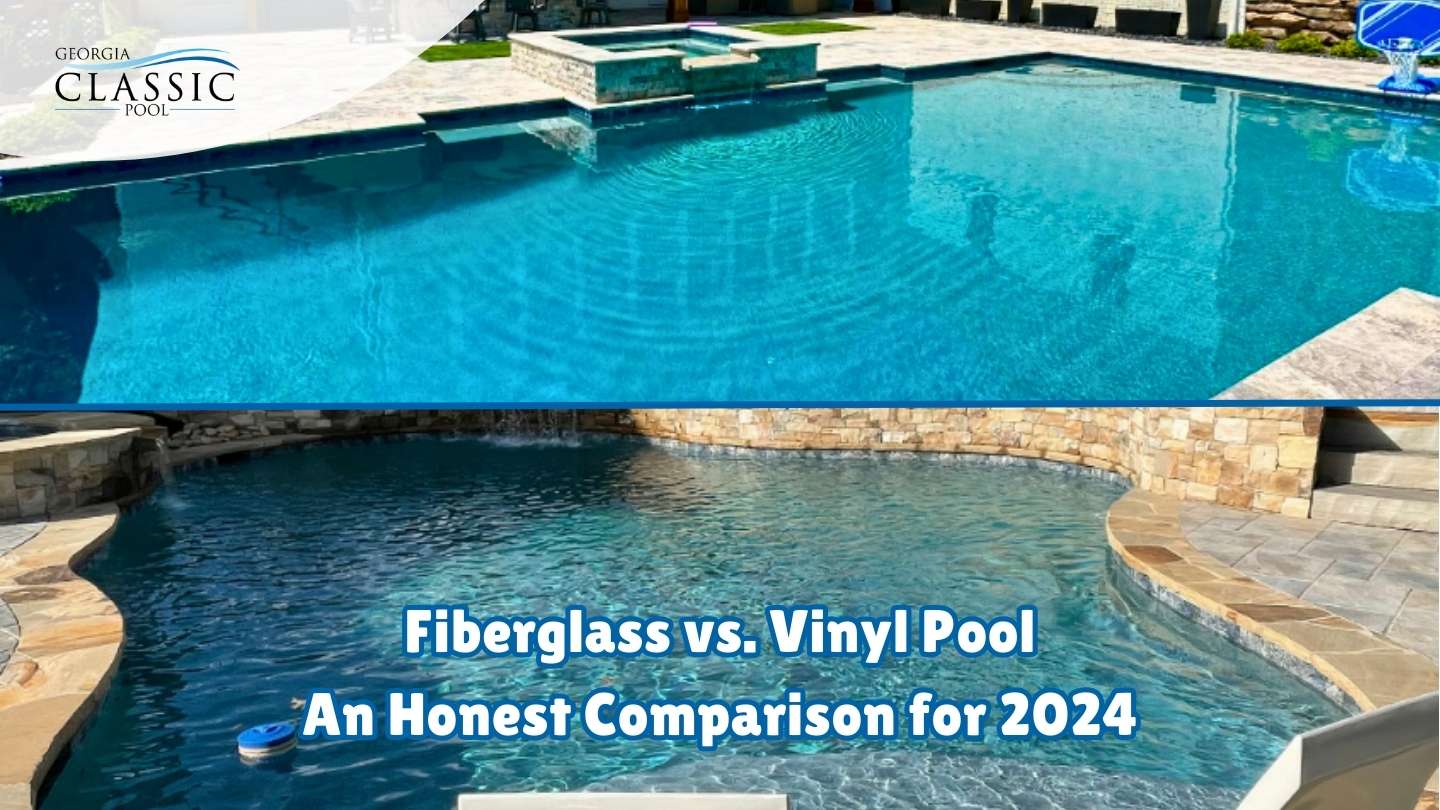Deciding between fiberglass inground pools and vinyl pools can be challenging. In this article, we’ll help you compare these two types based on factors like cost, durability, installation time, maintenance, and customization options. By understanding these differences, you can choose the pool that best fits your needs.
Key Takeaways
- Fiberglass pools offer quick installation, low maintenance, and durability, while vinyl liner pools provide extensive customization options but require more frequent liner replacements.
- Initial costs for fiberglass pools are higher ($45,000-$65,000) compared to vinyl liner pools ($30,000-$45,000), but fiberglass generally incurs lower long-term maintenance costs.
- Fiberglass pools typically feature a lifetime warranty and higher resale value compared to vinyl liner pools, which come with a limited warranty and potential long-term replacement expenses.
Fiberglass vs. Vinyl Pool: An Honest Comparison for 2024
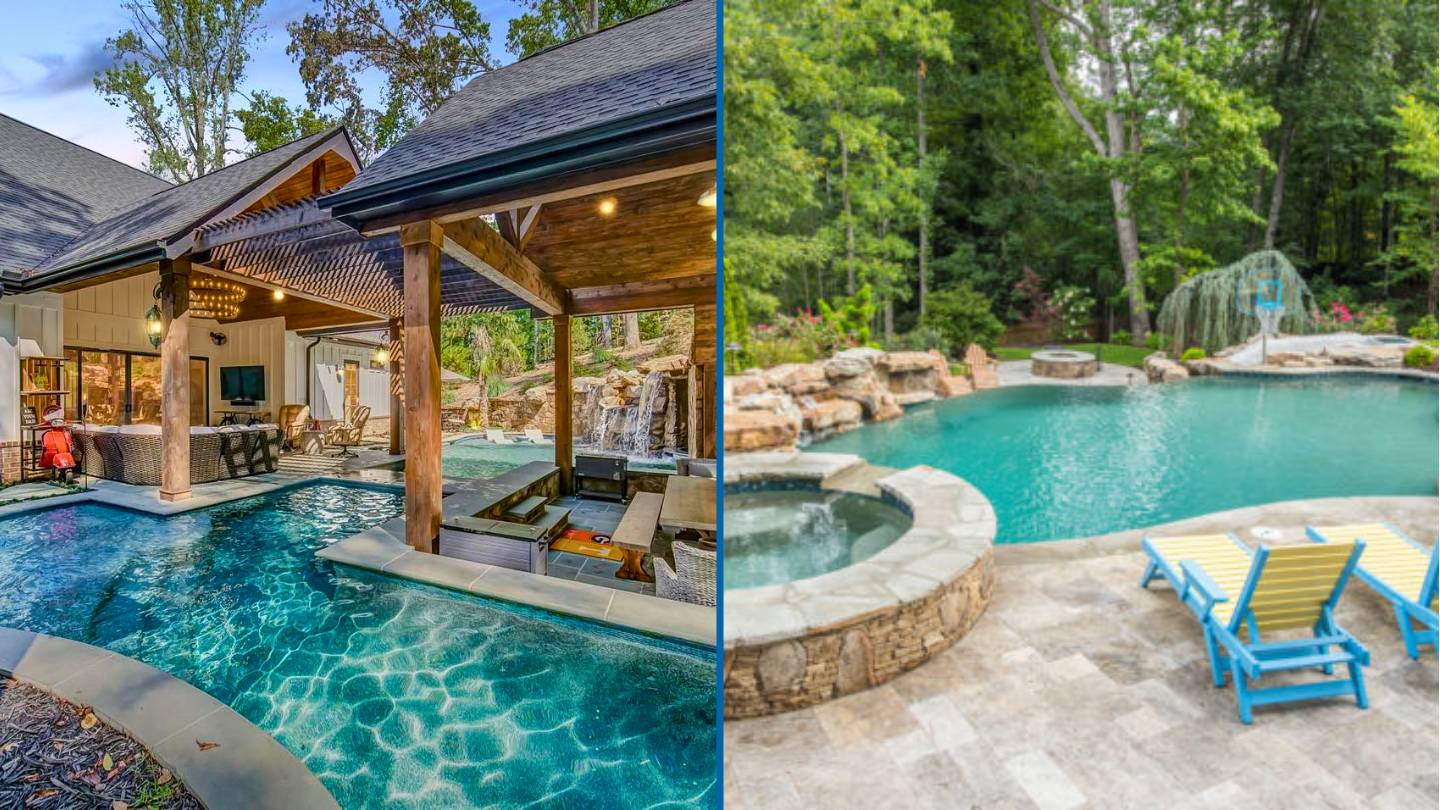
Deciding on a pool type typically comes down to comparing vinyl liner pools and fiberglass pools. A vinyl liner pool is constructed using either steel or polymer support frames lined with a flexible vinyl covering, while fiberglass pools are crafted from sturdy molded fiberglass material. Each option presents its own set of benefits and potential drawbacks that should be carefully considered.
While fiberglass pools boast quick installation times, lower upkeep costs, and come with built-in features straight from the manufacturer, their counterparts made with a vinyl liner provide extensive possibilities for personalization. You can choose from an array of shapes, sizes, and depths to suit your preferences although it’s worth noting they may necessitate more regular replacements of the liner—a factor that could influence long-term expenses.
When vacillating between selecting a fiber glass or vinil pool (pool), various elements such as initial cost implications, setup duration expectations’ diversity in design choices availability’, ongoing care necessities plus lasting resilience should all be taken into account’. Grasping these distinctions will assist you in opting for an alternative most conducive to both your fiscal constraints and your preferred way of living.
Introduction
Embarking on the path to pool ownership entails selecting the appropriate type of pool. This critical choice will have long-term implications for your satisfaction, upkeep requirements, and financial commitment.
It’s often challenging to find impartial assessments of swimming pools because many are authored by firms that exclusively promote a single kind of pool, which may skew their views. Our objective is to provide an equitable analysis between fiberglass, vinyl liner, and concrete pools so you can make an informed decision grounded in reality rather than swayed by marketing tactics.
Gunite pools, for instance, offer extensive customization options and durability but come with a time-consuming installation process and higher maintenance costs compared to fiberglass and vinyl liner pools. Potential issues like concrete cancer also need to be considered.
Committed to equipping future pool owners with essential knowledge, Georgia Classic Pool extends its expertise in outdoor design and construction through this comparison. By examining each option’s advantages and disadvantages thoroughly, we guide you closer to achieving the perfect aquatic retreat in your backyard.
Overview of Fiberglass and Vinyl Pools
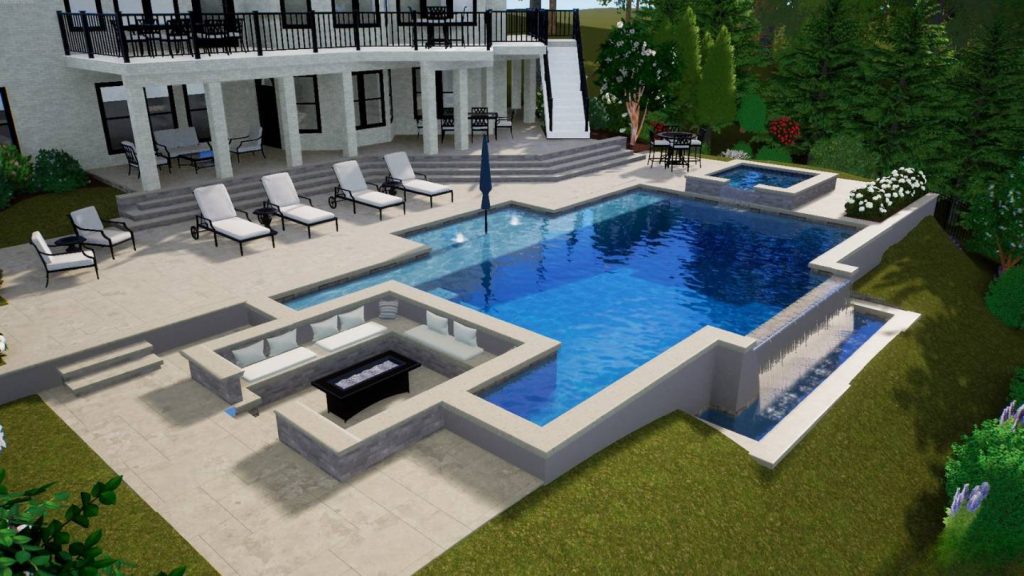
Fiberglass pools are fabricated at a remote location and transported to the site in one piece, which enables swift and effortless installation. They feature integrated elements like seats and steps. Because they’re produced in molds, the variety of designs available is restricted. Fiberglass swimming pools, made from advanced materials like Composite ArmourTM, are exceptionally tough, providing decades of service with minimal maintenance, making them a preferred choice for families looking to invest in a long-lasting and low-maintenance option.
In contrast, vinyl liner pools necessitate on-site assembly that includes excavating an area, erecting walls made from steel or polymer materials, followed by overlaying it with a vinyl sheet lining. This construction technique provides significant flexibility regarding customization for various shapes, sizes, and depths to meet specific design desires.
Though fiberglass pools provide benefits such as fast setup times along with reduced maintenance expenses and long-term resilience—vinyl liner pools deliver unmatched adaptability when it comes to personalization. It’s important to weigh aspects including aesthetic preferences alongside cost implications and your individual wishes for custom features before deciding on a pool type. Recognizing the distinctive advantages each style presents can aid you in choosing an option that aligns well with both your aspirations for your outdoor space as well as financial considerations.
Installation Process
When selecting between fiberglass and vinyl liner pools, the installation process is a crucial factor to weigh. The duration and intricacy involved in setting up your new pool can significantly influence your choice, especially if you’re eager to enjoy it without delay.
Fiberglass Installation
The process of setting up a fiberglass pool is notably efficient and simple. It arrives as a single, pre-fabricated shell that needs to be fitted into an excavation site after the plumbing framework has been installed. The entire setup usually spans just 2 to 3 days, which positions fiberglass pools among the fastest installations available.
For homeowners eager to reduce disturbance in their backyards, the expeditious and hassle-free installation associated with fiberglass pools stands out as a significant benefit. This speedy assembly time paired with the inherent longevity of fiberglass makes it an attractive choice for numerous households.
Vinyl Liner Installation
The installation of a vinyl liner pool, known for its customizable options, tends to have a longer timeline when compared to fiberglass pools. The duration can vary between four and eight weeks due to the multiple stages involved in its construction, such as digging out the area, setting up walls, and fitting the actual vinyl liner. This process is conducted on-site within the confines of one’s own yard and demands careful orchestration.
Despite being more time-intensive during installation than other materials, opting for a vinyl liner presents homeowners with an opportunity to tailor their inground pools precisely, from contours to dimensions down to desired depths. Such versatility is what often sways individuals looking for bespoke pool designs towards choosing a vinyl liner over alternative resources.
It’s important for potential owners who are eager to dive into their new swimming spot soon after deciding upon an addition like this that they must consider how much longer installing a vinyl-liner pool may take before enjoying that first swim.
Cost Analysis
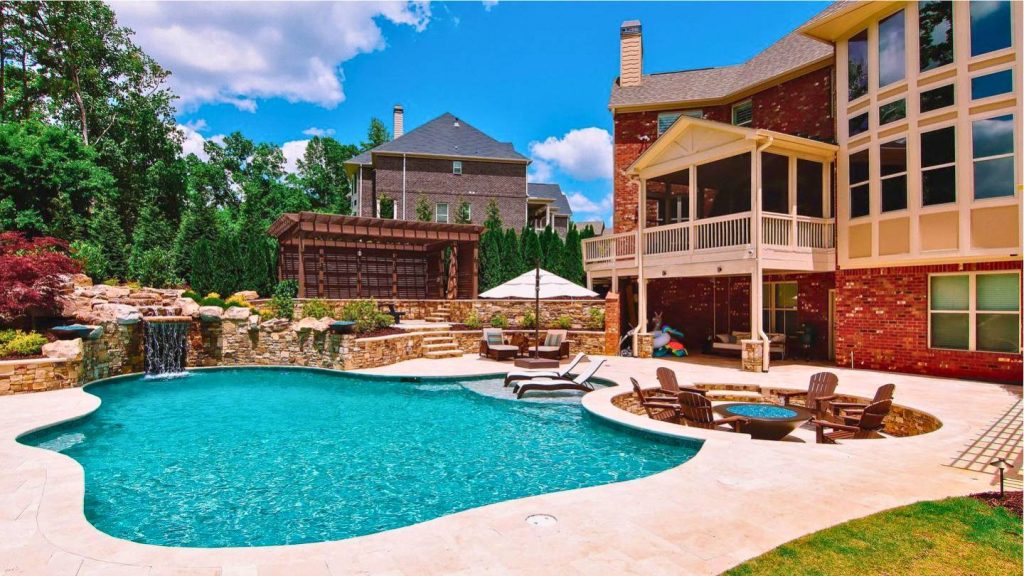
It’s essential to grasp the comprehensive financial commitment of pool ownership, which entails not just upfront expenses for installation, but also sustained outlays for maintenance and any necessary repairs down the line. This thorough understanding of both immediate and extended costs is vital when considering an investment in a swimming pool, as it could greatly impact your choice.
In conclusion, vinyl liner pools are more affordable upfront compared to fiberglass pools, making them a preferable option for budget-conscious consumers or those interested in DIY projects. However, while vinyl liners are cheaper initially, fiberglass may prove to be a more cost-effective choice over time due to lower long-term expenses.
Initial Costs
The initial cost for fiberglass pools is often greater than that of vinyl liner pools. The typical price range for fiberglass pools usually lies between $45,000 and $65,000. In contrast, the starting prices for packages of vinyl liner pool models are relatively lower, falling within the bracket of $30,000 to $45,000. Various elements including geographic location, choice of pool model and additional features can affect these expenses. Notably with vinyl liner pools, when customizations come into play, they can notably raise one’s budget.
When contemplating between a fiberglass or a vinyl liner pool it’s crucial to account not just for upfront costs but also for long-term expenditures such as those required for maintenance over time. For instance, replacing a vinyl liner may become necessary after some years at an expected expense ranging from $4,000 to $6,000—a significant outlay worth considering during your decision-making process regarding which type of pool suits you best financially in the long run.
Long-Term Costs
Fiberglass pools are known for their reduced maintenance costs over time to vinyl liner pools. This is because the fiberglass material features a non-porous surface that demands less chemical treatment and cleaning, resulting in decreased overall upkeep expenses. With appropriate care, fiberglass pools have the potential to endure from 25 to 30 years or more.
On the contrary, vinyl liner pools usually necessitate new liners every five to nine years due to wear and tear. Although these types of pools may come at a lesser initial investment, they can become more expensive over the course of time owing to frequent replacements required after about every 8-10 years – which is considered the average lifespan of a vinyl liner before it requires changing.
Durability and Longevity
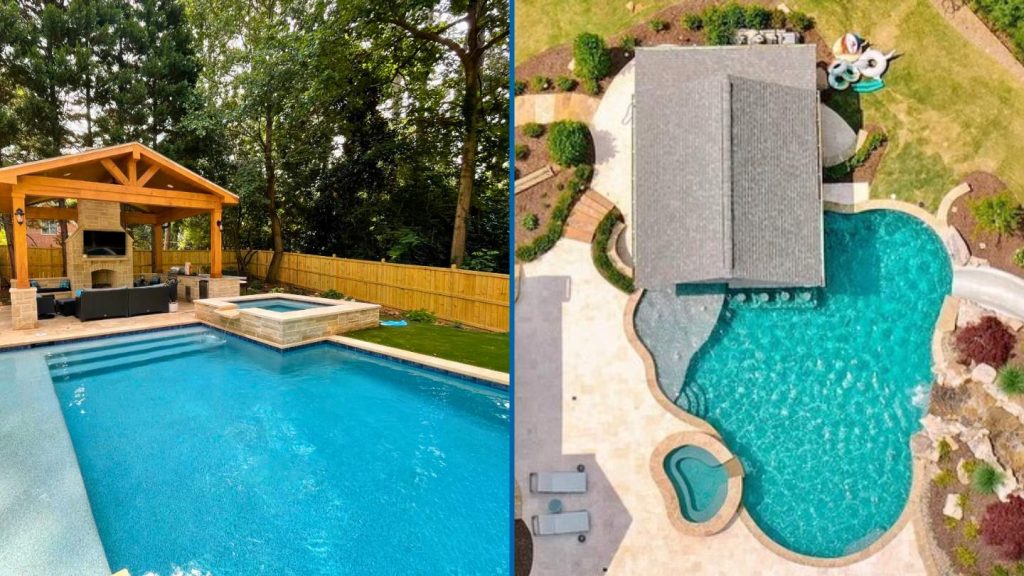
The importance of durability and longevity cannot be overstated, as they have a direct impact on the pool’s overall lifespan as well as the frequency with which repairs or replacements are necessary. A concrete pool, while offering superior customization options and design flexibility, generally requires more maintenance and has a longer installation time compared to fiberglass and vinyl liner pools.
Fiberglass Durability
Renowned for their enduring nature and low maintenance requirements, fiberglass pools can surpass the 30-year mark with ease. Their robust fiberglass shell is highly resistant to a range of environmental factors, maintaining its integrity without substantial deterioration.
Incorporating cutting-edge materials like Composite Armour and Dupont Kevlar into their composition has elevated the toughness and resilience of fiberglass pools. The gelcoat layer applied to these pools not only creates a hard-wearing exterior but also plays an integral role in curbing algae proliferation, thereby reducing the reliance on heavy chemical use.
With such attributes at hand, it’s clear why fiberglass pools stand out as a sturdy and lasting choice for homeowners seeking reliability from their swimming pool investment.
Vinyl Liner Durability
Vinyl liner pools offer the benefit of customizability but fall short in longevity when compared to fiberglass pools. On average, a vinyl liner has a lifespan of approximately 7 years and is susceptible to damage from sources like pet claws, pool toys, and various other threats. To prolong the life expectancy of a vinyl liner, maintaining proper water chemistry is crucial.
Although welded seams are engineered to reduce leakage risks, they do not match up to the sturdiness inherent in fiberglass pools. Consequently, there’s an increased likelihood that more frequent maintenance will be required for repairs or replacement of vinyl liners—this results in affecting long-term resilience adversely for those with vinyl liner pools.
Maintenance Requirements
For anyone owning a swimming pool, it’s crucial to consider maintenance since it has an immediate impact on both the longevity of the pool and its overall cost of ownership.
When compared with vinyl liner pools, fiberglass pools are known for their reduced maintenance requirements.
Fiberglass Maintenance
The smooth, non-porous gel lining of fiberglass pools facilitates maintenance by making cleaning less complicated and decreasing the necessity for chemicals. Regular testing to ensure water chemistry is balanced remains essential. Managing the water balance in these pools tends to be quite simple.
Fiberglass pools feature a gelcoat surface that hampers the proliferation of algae, thereby curtailing the need for frequent shock treatments and chemical applications. Consistent brushing assists in preserving a lustrous look while averting stains, which streamlines upkeep efforts.
Vinyl Liner Maintenance
Regular assessments are essential for vinyl liner pools to detect any possible rips, leaks, or color loss. It is vital to keep the water chemistry and sanitizer concentrations in check. Caution should be exercised to avoid causing punctures or tears in the vinyl liner.
To control algae growth, especially in spots with insufficient water circulation, it’s important to routinely clean the liner. Be aware that replacing a vinyl liner might incur expenses between $4,000 and $5,000—this contributes additional costs over time for upkeep of these pools.
Customization Options
Many pool owners value the ability to personalize their swimming experience through customization. Vinyl liner pools and fiberglass pools both provide options for customization, though there is considerable variation in the scope and type of customizations available with each. When comparing vinyl liner vs fiberglass and concrete pools, vinyl liner pools offer more flexibility in shape and size, while concrete pools provide the highest level of customization.
Fiberglass Customization
Compared to vinyl liner pools, fiberglass pools offer fewer customization options. The pre-fabrication of fiberglass pools means they usually come in standard forms such as freeform, rectangle, and kidney shapes. Due to the limitations posed by transportation, these pools are often restricted in size to a maximum of around 16 feet in width and 40 feet in length.
Despite this limited shape flexibility for fiberglass installations, homeowners can still personalize their pool with various color selections and surface finishes. Fiberglass models also accommodate certain built-in amenities like tanning ledges as well as benches and seats for added comfort. One can enhance the visual appeal of a fiberglass pool through supplementary water features or LED lighting systems. Even though there is more design limitation with fiberglass compared to vinyl liners, overall personalization opportunities do exist within those constraints.
Vinyl Liner Customization
Vinyl liner pools are celebrated for their vast array of customization possibilities, catering to individuals seeking distinctive design features. These pools offer the freedom to select from an assortment of shapes, sizes, and depths—providing homeowners with the opportunity to tailor a swimming area that aligns perfectly with their specific taste. You have the option of opting for a straightforward rectangular shape or exploring more intricate freeform structures. Vinyl liner pools can fulfill any unique pool concept.
The scope for personalization doesn’t stop at external configurations, but also extends into interior aesthetics through a selection of varied patterns and hues available in vinyl liners. This allows you not only to engineer the structural dimensions but also artistically color-coordinate your pool’s appearance according to your preferences. Vinyl liner pools stand out as an optimal solution among those who value extensive creative control and individualized detail in their home amenities.
Surface Texture and Comfort
Vinyl liner pools and fiberglass both provide a cozy environment for swimmers, yet the texture of their surfaces is distinctly unique.
Fiberglass Surface
Fiberglass pools are renowned for their sleek gelcoat surface, which offers a comfortable and enjoyable experience for swimmers. This finish not only gives the pool an attractive shine, but also guarantees that the surface is soft to the touch. Fiberglass pools typically come equipped with slip-resistant textures on steps and tanning ledges, increasing safety for users.
The smoothness of fiberglass pools aids in minimizing algae growth, simplifying upkeep tasks while providing a more pristine swimming space. The blend of user comfort and low maintenance demands renders fiberglass pools a popular choice among homeowners.
Vinyl Liner Surface
Vinyl liner pools are known for their smooth and comfortable surfaces that are easy on swimmers. Yet, the welded seams in vinyl liners might be noticeable upon contact and could slightly compromise the seamless feel of the pool surface. These liners typically resist algae formation effectively. Still, if not maintained adequately, algae can accumulate along the seams.
The supple nature of a vinyl liner makes for an enjoyable swimming session. It is imperative to adhere to consistent upkeep routines to prevent any damage like punctures or tears from occurring within it. These characteristics render vinyl liner pools as both agreeable and adaptable options favored by numerous homeowners.
Energy Efficiency
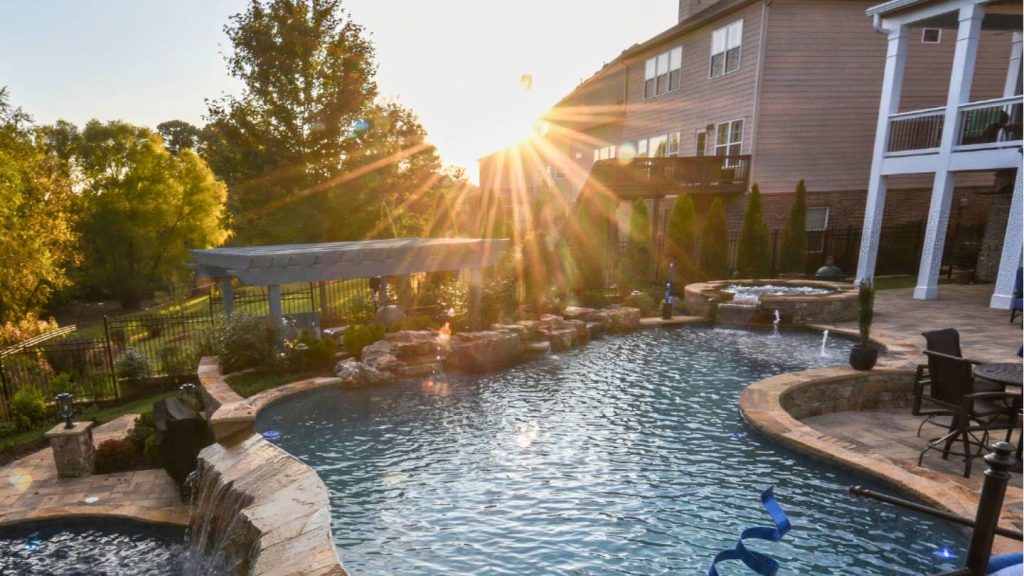
Considering energy efficiency is vital for pool owners who aim to lessen their ecological footprint and cut down on utility expenses. Fiberglass pools necessitate less energy for upkeep than vinyl liner pools due to their insulation capabilities that aid in heat retention.
The reduced duration of pump cycles in fiberglass pools aids in conserving energy, which bolsters their overall efficiency. Although with the appropriate pump and filtration systems, vinyl liner pools can achieve a level of energy-efficiency too. They tend to use more energy when compared with fiberglass options.
Both fiberglass and vinyl liner pools require less power than concrete ones do—positioning them as more eco-friendly choices for those concerned about the environment.
Read more: How Often Should I Clean My Pool Filter?
Chemical Usage and Water Quality
When it comes to chemical usage and water quality, both vinyl liner pools and fiberglass pools have their own sets of advantages and challenges. Vinyl liner pools often require a higher amount of chemicals to maintain proper water balance. This is because the vinyl material can absorb chemicals, which can affect the water’s pH levels and necessitate more frequent adjustments.
On the other hand, fiberglass pools feature a non-porous gel coating that significantly minimizes chemical absorption. This makes it easier to maintain a stable water balance, reducing the need for frequent chemical treatments. The smooth surface of fiberglass pools also helps in preventing algae growth, which is a common issue in pools with porous surfaces.
In terms of water quality, both types of pools can provide excellent conditions if properly maintained. However, fiberglass pools tend to have an edge due to their non-porous surface, which reduces the risk of algae growth and bacterial contamination. Vinyl liner pools require more diligent cleaning and maintenance to prevent these issues, as algae and bacteria can more easily take hold in the seams and folds of the liner.
Overall, if ease of maintenance and chemical efficiency are high on your priority list, a fiberglass pool might be the better choice. However, with proper care and regular maintenance, vinyl liner pools can also offer a clean and enjoyable swimming experience.
Warranty and Resale Value
When making an investment in a pool, it is essential to take into account warranties and the impact on your home’s resale value. The type of pool you select can significantly influence ongoing expenses and the future market value of your property.
Fiberglass Warranties
Homeowners can enjoy considerable tranquility knowing that fiberglass pools usually include a lifetime warranty. This type of warranty typically encompasses the pool’s structural integrity, affirming its enduring quality and reducing the need for regular maintenance. The profound assurance provided by such warranties adds to the attractiveness of these pools, potentially elevating your property’s marketability.
In contrast to their vinyl and concrete counterparts, fiberglass pools boast more extensive and enduring warranties. Their reputation for reliability positions them as a preferred selection among individuals who prioritize durability coupled with minimal upkeep requirements in their swimming pool options.
Vinyl Liner Warranties
Typically, vinyl liner pools are accompanied by a limited warranty spanning 20 years. This comprises a comprehensive 3-year warranty followed by a prorated warranty that extends for the remaining 17 years. The protection offered under this arrangement decreases progressively with time, meaning as the vinyl liner gets older, the owner is faced with escalating costs when it comes to replacing it.
Given that warranties for vinyl liners tend to be limited and decrease in value over time, considering how often replacements may be necessary can adversely affect the marketability of such pools. Prospective buyers might hesitate due to anticipated ongoing expenses and upkeep requirements related to owning a pool with a vinyl liner, thus potentially decreasing its appeal when it’s up for sale.
Resale Value and Aesthetics
When considering the resale value and aesthetics of your pool, fiberglass pools often come out on top. Known for their sleek and modern design, fiberglass pools can significantly enhance the visual appeal of your backyard, potentially increasing the resale value of your home. These pools are available in a wide range of colors and finishes, allowing homeowners to customize the look to perfectly match their landscape and personal style.
Vinyl liner pools, while also aesthetically pleasing, may not offer the same level of customization as fiberglass pools. However, they do provide a variety of shapes, sizes, and liner patterns, which can still create a visually appealing pool area. The flexibility in design allows homeowners to achieve a unique look, although the overall finish might not be as polished as that of a fiberglass pool.
In terms of resale value, fiberglass pools generally have an advantage due to their durability and low maintenance requirements. Prospective buyers often view fiberglass pools as a more attractive option because of their long-lasting nature and the reduced need for frequent repairs or liner replacements. While vinyl liner pools can still add value to a property, the potential for higher maintenance costs and the need for periodic liner replacements might be seen as drawbacks.
Ultimately, if you’re looking to maximize your home’s resale value and enjoy a modern, customizable pool design, a fiberglass pool could be the better investment. However, vinyl liner pools remain a viable option for those seeking affordability and design flexibility.
Support and Customer Service
Support and customer service are crucial factors to consider when investing in a pool, as they can significantly impact your overall ownership experience. Fiberglass pool manufacturers are often praised for their excellent customer service and support. Many of these manufacturers offer comprehensive warranties that cover the pool’s structural integrity for a lifetime, providing homeowners with peace of mind. Additionally, dedicated customer service teams are typically available to assist with any issues or questions that may arise.
Vinyl liner pool manufacturers also offer support and customer service, though it may not be as extensive as what is provided by fiberglass pool manufacturers. Many vinyl liner pool companies offer limited warranties, often around 20 years, with coverage that diminishes over time. However, these manufacturers frequently provide online resources and support, making it easier for homeowners to find the information and assistance they need to maintain and repair their pools.
In conclusion, when it comes to chemical usage and water quality, fiberglass pools tend to have an advantage due to their non-porous surface and ease of maintenance. In terms of resale value and aesthetics, fiberglass pools also tend to have an edge due to their sleek and modern design and customization options. Finally, when it comes to support and customer service, fiberglass pool manufacturers generally offer more comprehensive warranties and dedicated support, making them a more attractive option for many homeowners.
Summary
In summary, both vinyl liner pools and fiberglass pools come with their own set of benefits and drawbacks. Fiberglass pools boast a speedy installation process, reduced upkeep expenses, and exceptional durability over time. The smooth gelcoat surface they feature not only enhances the comfort of swimming, but also lessens the need for maintenance chemicals.
Conversely, vinyl liner pools shine due to their vast array of customization options and versatility in design. Yet these types of pools necessitate more regular replacements of liners and incur greater ongoing costs for maintenance. When deciding between a vinyl pool or a fiberglass one, your decision should be based on what you value most—whether that’s cost considerations or specific aesthetic desires.
For those who seek expert advice and services related to installing and maintaining a pool, Georgia Classic Pool is a premier swimming pool builder in Atlanta ready to deliver personalized solutions designed just for you. We pride ourselves on being an esteemed professional resource dedicated to aiding clients in crafting their ideal backyard retreats.
Note: Georgia Classic Pool only installs shotcrete pools. This means that while we provide comprehensive information on fiberglass and vinyl liner pools, our expertise and services are focused on the installation and maintenance of shotcrete pools.
Frequently Asked Questions
What are the main differences between fiberglass and vinyl liner pools?
Fiberglass pools offer quick installation and lower maintenance with greater durability, while vinyl liner pools allow for more customization but require frequent liner replacements.
Choosing between them depends on your priorities for maintenance and design flexibility.
How long does it take to install a fiberglass pool compared to a vinyl liner pool?
Fiberglass pools can be installed in about 2 to 3 days, whereas vinyl liner pools usually require 4 to 8 weeks for installation due to their more complex construction process.
What are the cost differences between fiberglass and vinyl liner pools?
Fiberglass pools typically have a higher upfront cost but result in lower long-term maintenance expenses.
In contrast, vinyl liner pools are more affordable initially, but incur higher replacement costs for liners over time.
Which type of pool is more durable?
Fiberglass pools are more durable, often lasting over 30 years, while vinyl liner pools need replacement every 7 years. Therefore, if durability is your priority, fiberglass is the superior choice.
How do warranties for fiberglass and vinyl liner pools compare?
Fiberglass pools often come with lifetime warranties that guarantee their structural soundness, while vinyl liner pools usually come with more restricted 20-year warranties which diminish in terms of coverage as time goes by.
As a result, fiberglass pools offer stronger protection over an extended period when compared to vinyl liner pools.

